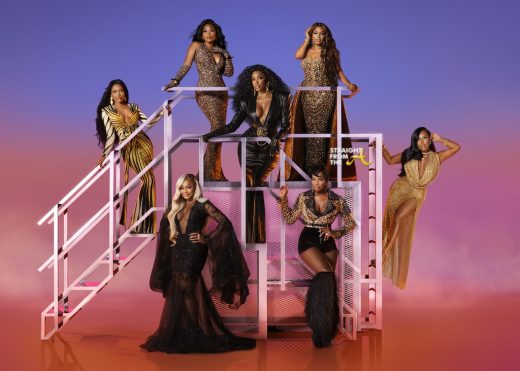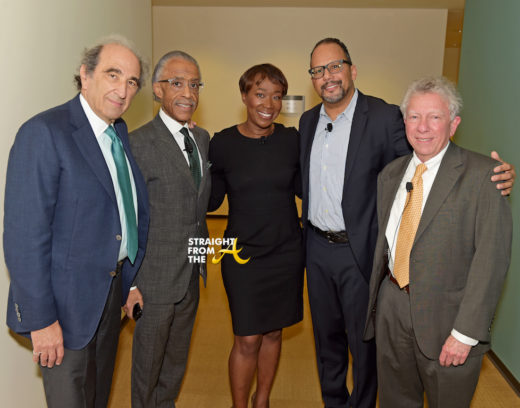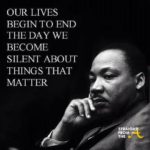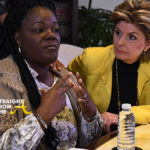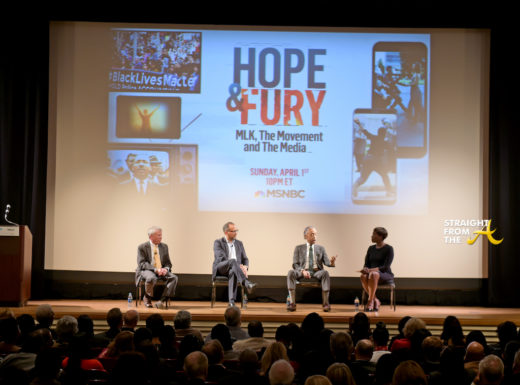
The release of the documentary marks the 50th anniversary of Dr. King’s assassination in Memphis and the screening event was held in honor of Dr. King and the legacy of the civil rights movement.?
Andy Lack, NBC News Chairman and Executive Producer, introduced the riveting documentary, and afterwards MSNBC host Joy Reid moderated a conversation about?the power of images during the civil rights movement?with panelists Rev. Al Sharpton; Hank Klibanoff,?Pulitzer Prize-winning co-author of ?The Race Beat?; and?Phil Bertelsen,?award-winning producer and director of the film.
Special guests in attendance included Kathleen Cleaver, civil rights activist and former Black Panther; Deborah Watts, cousin of Emmett Till; and?C.T. Vivian, Presidential Medal of Freedom recipient.
More details + view a clip of the documentary below…
(l-r) Andy Lack, Rev. Al Sharpton, Joy Reid, Phil Bertelsen, Hank Klibanoff
Following the advanced screening,? MSNBC host Joy Reid (center) moderated a panel discussion about how the media impacted the civil rights movement.
Below are a few notable quotes obtained during the session:
Andy Lack, NBC News Chairman and Executive Producer of?HOPE & FURY: MLK, THE MOVEMENT AND THE MEDIA
?It?s?quite?unusual for a?network?these days to?run?a two-hour documentary so the commitment from NBC News is serious, it?s deep, and this subject matter deserves it.”
Joy Reid, Host of MSNBC’s AM Joy
?One of the things that people forget is that King was in the young generation that was converting to TV ? he was in his 20?s when Emmett Till and the Montgomery Bus Boycotts happened so he understands TV. As said in the film, he had to keep on amping it up to keep the media?s interest.?
Rev. Al Sharpton, Host of MSNBC?s PoliticsNation
?This is the first time I?ve seen a real study on a network that showed the strategic way the movement was held because everybody can see what we had to live every day.”
Hank Klibanoff,?Pulitzer Prize-winning co-author of ?The Race Beat?
?In 1957, television suddenly exploded on the scene. So for a story going forward from there that was going to ignite ? it was going to ignite on television and everyone was going to get to see it.?
Phil Bertelsen, Producer and Director of?HOPE & FURY: MLK, THE MOVEMENT AND THE MEDIA
?Civil rights protests have entered the 21st century, and the degree to which Dr. King inspired a new generation who fully understand that the struggle continues and are taking every advantage of technological advancement and even access to their own stories, I think there?s a tremendous amount of hope.?
Marking the 50th anniversary of the assassination of Dr. King in Memphis,?HOPE & FURY: MLK, THE MOVEMENT AND THE MEDIA?is a gripping account of American history told like never before by an all-star lineup of civil rights leaders, pioneering African-American reporters who chronicled the movement, journalists from across generations, as well as present-day activists who have adopted the tactics of their forebearers to shine a light on inequality in the modern era. The film offers a fresh look at the historic civil rights movement and combines first-hand personal recollections with rare, archival footage and photographs ? some of which will be broadcast on network television for the first time.
From the murder of Emmett Till, Little Rock and Selma to modern day events in Charlottesville and Ferguson, the film navigates the struggles of the civil rights movement in the 1960s and draws a straight line to a new generation of activists including the Black Lives Matter movement. The documentary shows how protesters using social media today employ the same strategies as Dr. King and movement leaders when stark images of brutality moved a nation and made history. The film also highlights how today?s protestors communicate directly to mass audiences via digital platforms like Facebook and Twitter and tell their stories firsthand by broadcasting chilling, unfiltered footage in real time, as with the live-streamed death of Philando Castile.?HOPE & FURY: MLK, THE MOVEMENT AND THE MEDIA?explores how much has ? and hasn?t ? changed since Dr. King mobilized the country.
?By the brilliant design of Dr. King and the movement?s leaders, each chapter of the civil rights struggle played out dramatically on the evening news,? said Andy Lack. ?Powerful images beamed into living rooms, haunted Americans and eventually brought about historic change. Today?s movements have smartphones and live streams ? but they still depend on the sheer force of video and pictures to tell a story and move people to action.?
You can catch the full documentary this Sunday, April 1st at 10pm ET on MSNBC.
![Straight From The A [SFTA] – Atlanta Entertainment Industry Gossip & News - Atlanta's Most Reliable Source of Entertainment Gossip!](https://straightfromthea.com/wp-content/uploads/2015/04/sftalogo31.png)

